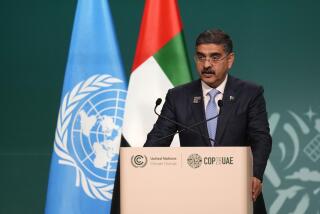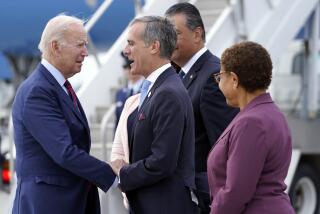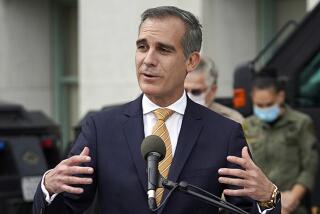Pakistan ambassador to the United States resigns
Reporting from Islamabad, Pakistan — Pakistan’s ambassador to the United States stepped down Tuesday after accusations that he engineered a memo to the U.S. urging Washington to help rein in the Asian nation’s powerful armed forces.
Husain Haqqani’s decision to step down made him the first political casualty in a scandal that has exposed the growing chasm between Pakistan’s civilian government and military leadership.
Haqqani, a close ally of President Asif Ali Zardari and widely regarded as an influential figure in Washington, quit after being requested to do so by Prime Minister Yousuf Raza Gilani, according to a statement issued by Gilani’s office.
Before resigning, Haqqani met with Zardari, Gilani, army Chief of Staff Gen. Ashfaq Kayani and the country’s spy agency chief, Lt. Gen. Ahmed Shuja Pasha, at the prime minister’s residence in Islamabad, the capital, to discuss the scandal, Pakistani television channels reported.
Haqqani has been at the center of a growing controversy involving Pakistani American businessman Mansoor Ijaz’s claim that the envoy had enlisted him to convey a memo to Adm. Michael G. Mullen, then chairman of the U.S. Joint Chiefs of Staff. The note, allegedly from Zardari, sought Washington’s assistance in fending off a possible government overthrow by Pakistan’s military after the American commando raid that killed Osama bin Laden on May 2.
In exchange for Washington’s intervention, the unsigned letter stated, Zardari’s administration would eliminate a wing of the Inter-Services Intelligence spy agency, or ISI, that maintains links with Afghan insurgent groups, and give U.S. troops the go-ahead to hunt down Al Qaeda leaders and Afghan militants enjoying sanctuary in Pakistan’s tribal areas.
Mullen has acknowledged receiving the memo, though his spokesman at the time said Mullen did not think it was credible and disregarded it. Mullen also did not believe it came from Zardari, a Pentagon spokesman told reporters in Washington on Monday.
Haqqani had denied any involvement in the memo but had offered to quit to defuse the crisis, which has renewed long-standing tensions between Pakistan’s military and the Zardari administration. Although the country’s constitution makes the military subordinate to the government, the armed forces and the ISI have wielded ultimate control for most of the nation’s 64-year history.
Military leaders view Zardari as too close to Washington.
Details from Haqqani’s meetings with top military and civilian leaders were not released, and he could not be reached for comment late Tuesday night. On his Twitter account, he announced that he was stepping down and added, “I have much to contribute to building a new Pakistan free of bigotry and intolerance. Will focus energies on that.”
Despite Haqqani’s resignation, the so-called Memogate scandal appears far from over. Opposition parties have demanded an investigation into whether Zardari authorized the memo. Critics of the president’s administration have called the letter’s contents tantamount to treason.
Experts have pointed out that Zardari enjoys immunity from prosecution while in office. But any links to the memo could damage his credibility at a time when the ruling Pakistan People’s Party is under mounting pressure from opposition leaders such as former Prime Minister Nawaz Sharif and cricketer-turned-politician Imran Khan. Some observers have suggested that the controversy could spark calls for early elections.
Gilani’s office stated that the government would conduct an investigation into Ijaz’s allegations.
For many Pakistanis, the memo has renewed fears that the Zardari government has routinely allowed the United States to trample on their nation’s sovereignty. Though Islamabad publicly denounces U.S. drone missile strikes against militants in the country’s tribal belt along the Afghan border, it has tacitly allowed the strikes to take place.
According to the memo, first published on the Foreign Policy magazine website, the civilian leadership allegedly was willing to grant the U.S. a host of concessions. They included the ability to more intensely scrutinize Pakistan’s nuclear weapons arsenal and to set up an independent panel to investigate any evidence of complicity by the government or military in Bin Laden’s long presence in the country.
Ijaz has backed up his claims by making public emails he says he and Haqqani exchanged at the time the memo was drafted. Haqqani has repeatedly rejected Ijaz’s allegations and has said he is prepared to face investigation.
Haqqani, 55, was working as a foreign policy analyst and an international relations professor at Boston University in 2008 when he was appointed as ambassador to the U.S. His work in academia and in government was preceded by an eight-year career in journalism in the 1980s covering the war in Afghanistan for Voice of America radio and writing about Pakistan and Afghanistan for the Far Eastern Economic Review.
He has been a staunch defender of Zardari and an ardent proponent of democratic reform. At times, however, he has been viewed by critics, particularly in the military, as too soft on the U.S. and its policies toward Pakistan.
More to Read
Sign up for Essential California
The most important California stories and recommendations in your inbox every morning.
You may occasionally receive promotional content from the Los Angeles Times.










